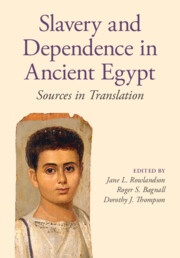Book contents
- Frontmatter
- Contents
- List of illustrations
- List of maps
- List of contributors
- Biographical notice on Jane Rowlandson
- Preface
- List of abbreviations
- Note to the reader
- Aids for the reader
- Glossary of technical terms
- 1 Introduction
- 2 Pharaonic Egypt
- 3 The Late Period
- 4 Jewish perspectives on slavery in Egypt
- 5 Ptolemaic Egypt
- 6 Roman Egypt
- 7 Byzantine and Umayyad Egypt
- Concordance of texts
- Bibliography
- Index
6 - Roman Egypt
Published online by Cambridge University Press: 01 March 2024
- Frontmatter
- Contents
- List of illustrations
- List of maps
- List of contributors
- Biographical notice on Jane Rowlandson
- Preface
- List of abbreviations
- Note to the reader
- Aids for the reader
- Glossary of technical terms
- 1 Introduction
- 2 Pharaonic Egypt
- 3 The Late Period
- 4 Jewish perspectives on slavery in Egypt
- 5 Ptolemaic Egypt
- 6 Roman Egypt
- 7 Byzantine and Umayyad Egypt
- Concordance of texts
- Bibliography
- Index
Summary
In Roman Egypt, Greek remained the language of rule but the introduction of the Roman legal system and practices resulted in changes within the bureaucracy and an increase in documentation. Declarations were now required for birth, death, taxes, and much else. There were minor changes in the vocabulary of slavery, but in terms of acquisition and use much remained unchanged. There was an active market in slaves who were primarily employed in the home. There is further evidence for slaves in labouring jobs, artisanal roles, in entertainment and sex work. Imperial slaves held some important administrative roles, and slaves might act as business agents in urban settings. Slave labour was little used in agriculture, though the balance between free and unfree changed over time. As earlier, the boundaries between these categories were sometimes blurred. There is evidence, too, for the manumission of slaves. Documents translated in this chapter illustrate the situation.
- Type
- Chapter
- Information
- Slavery and Dependence in Ancient EgyptSources in Translation, pp. 274 - 342Publisher: Cambridge University PressPrint publication year: 2024

